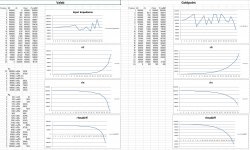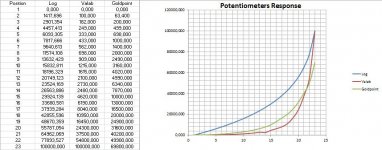which is the best model or brand of potentiometers out there to buy?
Switched resistors are better. Perfect tracking, low noise, any value.
Last edited:
Rayma, let me know if I understood well.
Are you saying to use switches with resistors between its pads, right?
So, you could use any value of resistors, any model of resistor, with a perfect tracking.
I guess the only negative point is the final price, probably too expensive.
And what's your opinion about digital potentiometers? Better or not?
Are you saying to use switches with resistors between its pads, right?
So, you could use any value of resistors, any model of resistor, with a perfect tracking.
I guess the only negative point is the final price, probably too expensive.
And what's your opinion about digital potentiometers? Better or not?
A stepped attenuator is what you want.
Actually I want the best potentiometer I can buy out there. Almost in all my boards, the potentiometer is the worse part I have in my PCBs.
I want to find or the best brand, or the best way to make this interface.
Potentiometers are noisy, fragile, and a source of problems, and I want to solve them.
A stepped attenuator would be a great, but expensive, indeed.
Another important thing is: price.
Thanks.
Actually I want the best potentiometer I can buy out there. Almost in all my boards, the potentiometer is the worse part I have in my PCBs. I want to find or the best brand, or the best way to make this interface.
Potentiometers are noisy, fragile, and a source of problems, and I want to solve them.A stepped attenuator would be a great, but expensive, indeed.
Another important thing is: price.Thanks.
You can build a good attenuator for a very reasonable price, I'd suggest Dale Rn60 resistors.
Attenuators and Signal Selecters
There are lots of switched volume controls on Ebay also.
Stepped attenuator STEREO - 48 steps - Volume control | eBay
Last edited:
Best bang for your buck are these Valab 23 Step Ladder Type Attenuator Potentiometer 100K Log Stereo | eBay
These have better resistors, but cost a bit more. kikitronic | eBay Their build it yourself kits are good value but having built one before i would happily pay someone else to do it in future.
I also have a couple of vintage Goldpoint attenuators which cost a lot more than these, but in all honesty they dont do anything that these ones dont.
These have better resistors, but cost a bit more. kikitronic | eBay Their build it yourself kits are good value but having built one before i would happily pay someone else to do it in future.
I also have a couple of vintage Goldpoint attenuators which cost a lot more than these, but in all honesty they dont do anything that these ones dont.
I want to find or the best brand, Another important thing is: price.
You can't really have both.
You got it. Thanks everybody!
Rayma,
I think using the attenuator with the Dale RN60 resistors, and Glass Ware similar PCB design, is the one I'll find what I look for. Indeed, the quality will be absolutely better than cheap pots, and a reasonable price.
And yes, I understand I can't get both, low cost and high quality.
Thank you very much for these tips!
Mcandmar,
The valab 23 is a good option too. Perhaps, the suggestion of Rayma is better in case of using different resistors values desired of each individual project; customizing its response, and so on...
But another considerable option to think of.
Thank you indeed!
sq225917,
I couldn't find a reasonable price with Goldpoint attenuators... In the other hand, its quality is assured.
Thank you!
Rayma,
I think using the attenuator with the Dale RN60 resistors, and Glass Ware similar PCB design, is the one I'll find what I look for. Indeed, the quality will be absolutely better than cheap pots, and a reasonable price.
And yes, I understand I can't get both, low cost and high quality.
Thank you very much for these tips!
Mcandmar,
The valab 23 is a good option too. Perhaps, the suggestion of Rayma is better in case of using different resistors values desired of each individual project; customizing its response, and so on...
But another considerable option to think of.
Thank you indeed!
sq225917,
I couldn't find a reasonable price with Goldpoint attenuators... In the other hand, its quality is assured.
Thank you!
Last edited:
You got it. Thanks everybody!
Rayma,
I think using the attenuator with the Dale RN60 resistors, and Glass Ware similar PCB design, is the one I'll find what I look for. Indeed, the quality will be absolutely better than cheap pots, and a reasonable price.
And yes, I understand I can't get both, low cost and high quality.
Thank you very much for these tips!
Mcandmar,
The valab 23 is a good option too. Perhaps, the suggestion of Rayma is better in case of using different resistors values desired of each individual project; customizing its response, and so on...
But another considerable option to think of.
Thank you indeed!
sq225917,
I couldn't find a reasonable price with Goldpoint attenuators... In the other hand, its quality is assured.
Thank you!
From memory Goldpoint have a calculator on there site that will work out resistor values for you. I plotted the resistors used in the eBay attenuator with Dale resistors, vs the vintage Goldpoint. Surprisingly different curves between them. Thought it might be of interest to you, both are 100k...
Attachments
Last edited:
Rayma, I think using the attenuator with the Dale RN60 resistors, and Glass Ware similar PCB design,
is the one I'll find what I look for. Indeed, the quality will be absolutely better than cheap pots,
and a reasonable price.And yes, I understand I can't get both, low cost and high quality.Thank you very much for these tips!
Good luck. I think that you'll find the kit to be of very high quality for the price.
Penny and Giles make very nice pots, as do Duncan, Alps, and possibly others. You have to be pretty specific, since most of what I have praised are linear faders, and not rotary pots, and their cost might be reasonable or completely outrageous for your use.
As others have said, switched attenuators work better, but if you pay a lot of money, an actual potentiometer can work acceptably well, depending upon your requirements.
As others have said, switched attenuators work better, but if you pay a lot of money, an actual potentiometer can work acceptably well, depending upon your requirements.
How about these:
Dact Type 21 Stepped Attenuator Potentiometer 50K D Shape Shaft | eBay
Uses SMD resistors.
Dact Type 21 Stepped Attenuator Potentiometer 50K D Shape Shaft | eBay
Uses SMD resistors.
If you choose a classical potentiometer, choose a value not higher than 10 kOhm, there is no reason to use the so often seen values of 22, 47 of even 100 kOhm.
Using an active volume control with a linear pot à la Baxandall/Self is an option you should consider. Compared to a log pot, the match of the tracks is better, the quality of the pot is less important and the output impedance is low. Overall, for me, the sensation of comfort is better than with stepped attenuators.
Using an active volume control with a linear pot à la Baxandall/Self is an option you should consider. Compared to a log pot, the match of the tracks is better, the quality of the pot is less important and the output impedance is low. Overall, for me, the sensation of comfort is better than with stepped attenuators.
I recommend a relay based, stepped attenuator. With a rotary encoder on the front panel. If you use independent attenuators for each channel, they implement the Balance function too. Relays are especially easy to operate by infrared remote control -- no troublesome motor-driven potentiometer to deal with. Just a 99 cent microcontroller IC and some software.
From memory Goldpoint have a calculator on there site that will work out resistor values for you. I plotted the resistors used in the eBay attenuator with Dale resistors, vs the vintage Goldpoint. Surprisingly different curves between them. Thought it might be of interest to you, both are 100k...
Well, I've plotted some curves on Excel quickly, in order to have a better vision to analyse the pots responses. They are a little bit different from the log theoretical response.
But, I guess, the most important point is its construction quality, if the pot is robust, and so on...
Indeed, its possible to make some modifications on the pot response... but the device parts quality is essential to make a good product/piece/device.
Going to look for every tip all of you have mentioned. And, when I get the measurements done, I'll let you know.
Thanks everyone!
Attachments
Last edited:
- Status
- This old topic is closed. If you want to reopen this topic, contact a moderator using the "Report Post" button.
- Home
- Design & Build
- Parts
- Which is the best potentiometer to buy?

